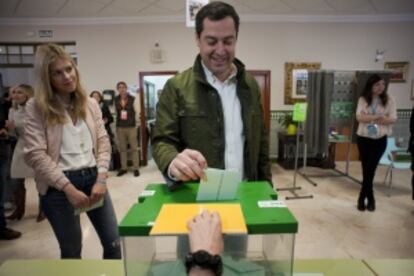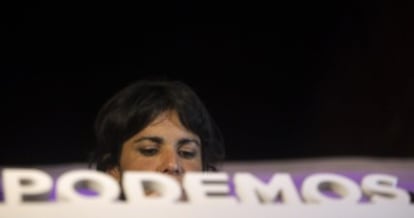Socialists win in Andalusia but party still falls short of majority
PP is weakened while Podemos becomes third political force in Spain’s biggest region

The Socialists were re-elected in Andalusia on Sunday night in a hotly contested regional race that weakened Prime Minister Mariano Rajoy’s Popular Party’s (PP) control in the local parliament and propelled Spain’s growing anti-austerity Podemos into third place.
Premier Susana Díaz — who took over the job when her predecessor José Antonio Griñán suddenly resigned in 2012 — validated her leadership with voters by retaining the 47 seats the Socialists had previously held in parliament.
Díaz validated her leadership by retaining the 47 seats the Socialists had previously held in parliament
But she is still shy of a 55-seat majority in the 109-member body based in Seville, and will have to reach deals with minority parties to pass legislation. It was still unclear on Monday morning who that partner will be. Early in the campaign, Díaz ruled out any pacts with the PP or Podemos.
“It has been an historic and undisputed victory,” said the 40-year-old Díaz, who is expecting her first child.
Sunday’s vote was seen as a bellwether to the national elections, with other key races scheduled in Madrid and Valencia in May that will also test the PP’s strength.
Podemos, which has been gaining ground in national polls as an anti-austerity movement, captured 15 seats. It marked the first time the far-left party had taken part in a regional election since its strong debut performance in last year’s European Parliament race.

Ciudadanos – another fast rising party which started out in Catalonia and also appears to be challenging Spain’s more than 40-year long bipartisan system – captured nine seats in its first ever regional parliamentary election, thus becoming the fourth political force in Andalusia.
The United Left (IU) coalition – which has claimed the region as its stronghold over the past decade, thanks to a partnership government with the Socialists – obtained its worst results and only retained five of the seven deputy seats it won in 2012.
Díaz broke off with the IU in a coalition government in January after a series of differences and called early elections.
But it was the PP whom Andalusians punished most at the polls. The party suffered a major defeat by hanging on to just 33 of the 50 seats it held since the last race in 2012.

PP Andalusian leader Juan Manuel Moreno was set to meet with national party officials on Monday to review the race results.
Voter turnout was 51.4 percent – 4.2 points higher than the previous 2012 elections.
Political observers believe that the Socialists – many of whom have publicly shunned Podemos’ radical proposals – will look to form a pact with Ciudadanos. But its national leader, Albert Rivera, announced Sunday night that Ciudadanos will not join the Andalusian government.
“We will remain in the opposition forming other concrete pacts,” said Rivera, citing the fight against corruption.
Andalusians punished the PP by allowing them to keep only 33 of the 50 seats it held since the last race in 2012
Ciudadanos leader in Andalusia Juan Marín, who shares governing power with the Socialists in Sanlúcar, Cádiz province, said his party was surprised by the outcome.
“Andalusians have said they want change, but sensible change,” he said
The mood at the Podemos headquarters was euphoric but the party's regional leader, Teresa Rodríguez, reminded her supporters there was still work to be done, “because tomorrow we will see 45 home evictions.”
Diaz inherited a government from Griñán that is under a judicial public corruption investigation for a fraud scheme that allegedly siphoned off money from public funds set aside to help ailing businesses meet severance payments for laid-off workers.
The so-called ERE case has spun off separate investigations and Griñán, who governed from 2009 to 2013, and his own predecessor Manuel Chaves (1990-2009) have been named targets in the investigation.
In January, Diaz called early elections after declaring the IU coalition was unsustainable when a series of disagreements broke out, including over the IU’s plans to organize a referendum among its members this summer on whether to leave the coalition with the Socialists if Díaz’s government failed to push a series of reforms through parliament.
Tu suscripción se está usando en otro dispositivo
¿Quieres añadir otro usuario a tu suscripción?
Si continúas leyendo en este dispositivo, no se podrá leer en el otro.
FlechaTu suscripción se está usando en otro dispositivo y solo puedes acceder a EL PAÍS desde un dispositivo a la vez.
Si quieres compartir tu cuenta, cambia tu suscripción a la modalidad Premium, así podrás añadir otro usuario. Cada uno accederá con su propia cuenta de email, lo que os permitirá personalizar vuestra experiencia en EL PAÍS.
En el caso de no saber quién está usando tu cuenta, te recomendamos cambiar tu contraseña aquí.
Si decides continuar compartiendo tu cuenta, este mensaje se mostrará en tu dispositivo y en el de la otra persona que está usando tu cuenta de forma indefinida, afectando a tu experiencia de lectura. Puedes consultar aquí los términos y condiciones de la suscripción digital.








































